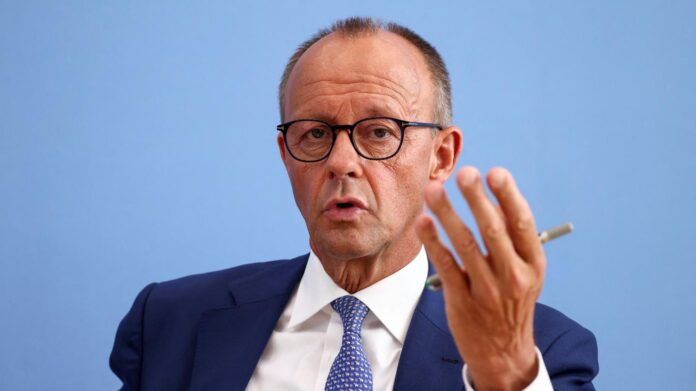
The next federal election will take place in September 2025, and the CDU/CSU have not yet decided who the Union’s candidate for chancellor will be. However, there are some indications that parliamentary group leader Friedrich Merz will run. For example, the “Picture on Sunday“ from party circles that CSU leader Söder wants to let Merz take the lead.
According to a survey, voters also have more trust in the CDU leader than in Incumbent Olaf Scholz (SPD) – this is especially true for economic issues.
As the “Bild am Sonntag” (“BamS”) reported, citing the opinion research institute Insa, 41 percent consider Merz to be significantly more competent in the area of economics, while only 20 percent consider Scholz. On the currently much-discussed topics of asylum/migration (40:19 percent) and internal security (39:21 percent), Merz is also far ahead of the Chancellor. Scholz can therefore only score points on the issues of social affairs (work/pensions) and climate/environmental protection. According to the report, Merz is ahead eight times in ten important policy areas, Scholz only twice.
There is one plus point for the Chancellor: a narrow majority (29:27 percent) According to the survey, Scholz is more sympathetic than MerzHowever, the CDU leader is ahead of Scholz in terms of credibility, general competence and leadership skills.
If the Chancellor were directly elected in Germany, Merz would currently receive 25 percent of the votes and Scholz 21 percent. A majority of 48 percent do not want either of them as head of government. Six percent did not give an answer.
All other four parties in parliament – that is, the SPD, the Greens, the AfD and the BSW – would have to join forces to achieve a majority against the CDU/CSU.
Hermann BinkertInsa boss
The Union parties can also be pleased about high approval ratings. In the Insa Sunday trend for the “BamS” CDU/CSU gained two points to 33 percent. According to the report, this is the highest value in this survey in three and a half years. The second strongest force is the AfD with 19 percent, the SPD loses one percentage point and is at 14 percent.
The Greens are stagnating at ten percent, as are the Sahra Wagenknecht Alliance (BSW). The FDP is at four percent, the Left at three percent. Both parties would therefore not be represented in the next Bundestag.
With a combined 28 percent, the three governing parties have reached their lowest value since taking office in December 2021. Insa surveyed 1,206 people between September 9 and 13.
Recommended editorial content
Here you will find external content selected by our editors that enriches the article with additional information. You can display or hide the external content with one click.
I agree to the external content being displayed to me. This means that personal data can be transmitted to third-party platforms. You can find more information about this in the data protection settings. You can find these at the very bottom of our page in the footer, so that you can manage or revoke your settings at any time.
Insa boss Hermann Binkert told the paper: “There is a parliamentary majority for the black-red coalition with a combined 47 percent. Alliances of the CDU/CSU with the Greens or BSW would each get 43 percent and are thus just on the threshold of a parliamentary majority.”
Without and against the Union, no government can be formed with these figures“All four other parties in parliament – that is, the SPD and the Greens, the AfD and the BSW – would have to join forces to achieve a majority against the CDU/CSU.”
Election polls are generally always subject to uncertainty. Among other things, weakening party ties and always shorter-term voting decisions the opinion research institutes weight the data collected.
Basically, surveys only reflect the opinion at the time of the survey and are no predictions on the election outcome. (lem)
